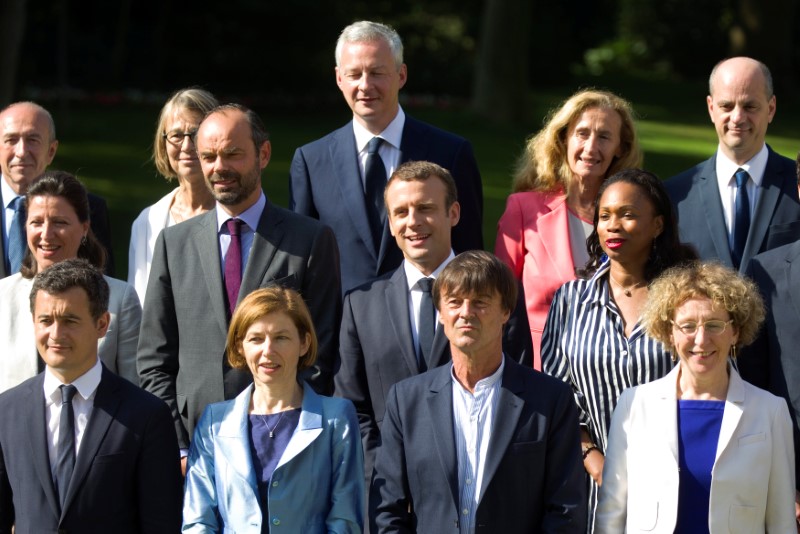By Michel Rose and Richard Lough
PARIS (Reuters) - When President Emmanuel Macron reshuffled his cabinet after four ministers with judicial probes hanging over them said they were quitting, he snubbed well-known heavyweights to fill the posts.
As his chief of staff read out the names for vacant portfolios including defense, justice and European affairs, the reaction of many French was: who?
It was unusual in a country where politics has long been perceived as the preserve of an old boys network, where political careers begin at an elite school for civil servants and last decades.
And it pointed to Macron's inclination to run government more like a business.
Among the picks were Nicole Belloubet, a 62-year-old public law expert and member of the Constitutional Court, as justice minister. Florence Parly, who spent the last 15 years working among the senior ranks of Air France and the SNCF state-owned rail company, became defense minister.
Neither are household names.
"You have a president and a prime minister who both have corporate backgrounds, and who want to ensure that people are appointed on the basis of their competences," said a Macron adviser.
Macron spent four years at Rothschild bank before entering politics, while his prime minister, Edouard Philippe, a lawyer, worked for nuclear giant Areva.
The adviser said Macron also wanted to avoid competition between ministers and their junior secretaries of state - something he experienced himself as economy minister under Socialist President Francois Hollande - which is why he had not given precise portfolios to many of them.
"The objective is managerial in as far as they are in a way the ministers' deputies," the adviser said.
MORE FREEDOM
Macron's reshuffle, tapping more people from the non-political world, reflects the profile of many of his newly elected members of parliament.
Heavyweight names from the Socialists and conservatives swirled, but in the end Macron largely picked relative unknowns, technocrats or private sector figures with either little or distant political experience.
Daily newspaper Le Monde described the reshuffle as "a good way for the head of state to give himself even more freedom to act".
Macron won a commanding majority in Sunday's parliamentary election with which to push through the deep-reaching social and economic reforms that he promises to revive France's regulation-laden economy.
Philippe told TF1 his new government is one that "brings together", a reference to the inclusion of members from the left, the right and the center.
On Thursday Philippe's government spokesman fended off questions over the suitability of businesswoman Parly - who served as junior budget minister under socialist Lionel Jospin from 2000-2002 - to head the defense ministry.
Government spokesman Christophe Castaner told reporters that what counted was her managerial background. "She's a manager who has proven herself," he said. "To have someone with that quality is a strength."

(This version of the story corrects minister's name in paragraph five)